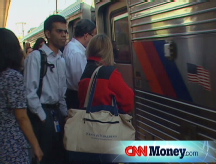Ditch that car, hop a train
As the price of gas soars, more and more commuters are leaving their cars in the garage and boarding the train.
NEW YORK (CNN) -- The soaring price of gas has convinced New Jersey resident Eric Scott to trade the comfort of his car for a seat on the train every morning after 17 years of driving to the office.
"It's a huge savings," said Scott., "In today's economy, you know, every penny counts so I'm just glad I made that switch."
Scott, a Senior Trust Administrator with Merrill Lynch in Hopewell, NJ, is saving more than $300-a-month by taking the train instead of driving the 72-mile roundtrip from his home in Willingboro, NJ. His monthly New Jersey Transit train pass costs $77, less than 1/4 of the $400 he had been spending on gas each month.
"I wish I would have done this sooner, it would have been savings in my pocket," said Scott.
Joanne Ralston, an administrative assistant with a medical management company in Hamilton, NJ is saving more than $200-a-month since she began riding a New Jersey Transit train in February instead of driving to the office.
"What I pay for my monthly pass is probably what I would have spent in about seven days for gas, so it's a huge savings for me," said Ralston. "It's an easy ride, no traffic, no stress, it's much better than driving."
As gas price keep climbing, a growing number of Americans are leaving their cars in the garage and getting on board trains. Commuter train lines around the country are reporting big jumps in first quarter ridership: up 15% in the suburbs of Seattle, 13% in the communities north of Miami, 7% in the region surrounding Minneapolis-St. Paul, and better than 5% in New Jersey.
Commuter bus service is also experiencing strong gains, while increases in urban bus and train ridership are generally more moderate since many city customers always rely on mass transit.
"We've really seen a very large increase in the use of public transit and particularly for the services that are longer distance in nature, commuter rail lines or express buses that go far into the suburbs," said William Millar, President of the American Public Transportation Association
"It's been a strong pattern each time the gas prices hit a new plateau, $3 or $3.50, we get increases in the rate that people are trying new services."
As gas prices jumped last year Americans took more than 10-billion rides on public transit, the most in 50 years, according to the American Public Transportation Association. Now, as the nation's average gas price approaches $4-a-gallon, a growing number of commuters are listening to the conductor when he says, "ALL ABOARD."
Ridership is at a record on New Jersey Transit, which estimates its average commuter saves $1,200-a-year by taking the train rather than driving to work.
"People can look at riding on the rails as not only saving money, but a much better way to travel," said Richard Sarles, Executive Director of New Jersey Transit.
"They can talk quietly on the cell phone, they can look at movies on their DVD players or i-pod, they can listen to music, in addition to many other things people can do like working or napping on a train that they can't do when they are driving."
With more people getting on board some commuters are squeezing into standing-room only trains and buses. It's still better than driving, though, said Marcia McPherson Gunnings as she stood on a NJ Transit train heading out of New York's Penn Station.
"I can live with that, compared to gas prices. I definitely can live with that," said McPherson Gunnings.
By sacrificing the privacy of their own vehicle mass transit users are also helping the environment, preventing 37 million tons of carbon dioxide emissions each year, according to the American Public Transportation Association.
Transit officials expect the trend toward growing ridership to continue so major expansion projects are underway. Dallas and Denver are growing their railroads and New Jersey Transit has a plan to build a new tunnel under the Hudson River into Manhattan. "The buzz is, get ready for more passengers. They are coming," said New Jersey Transit's Richard Sarles.
Gas prices have climbed to record levels. Are you feeling the pinch? Tell us how gas prices are affecting you and what you're doing to cope. Send us your photos and videos, or email us to share your story. ![]()





